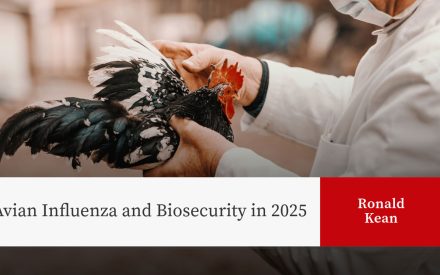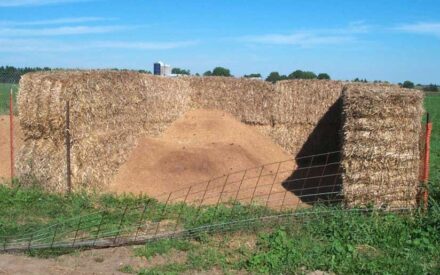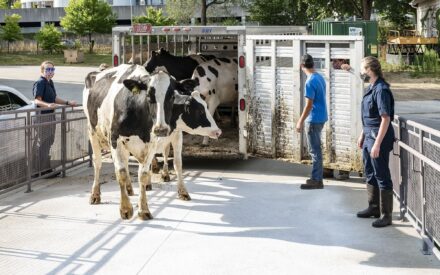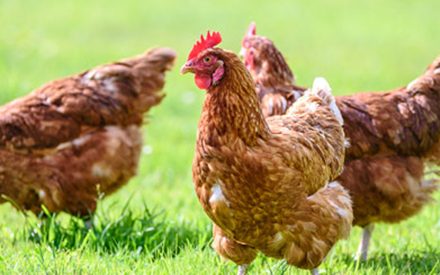Recently, there has been an outbreak of avian influenza (AI) in turkey flocks in the southeastern United States. This case was considered highly pathogenic. In response to this outbreak, a great deal of time and effort will be spent quarantining and testing adjacent flocks, and flocks testing positive are depopulated. This virus does not discriminate between large or small flocks, or husbandry type. In the past, large commercial flocks have been infected, as have small hobby flocks. In response to confirmed AI outbreaks, many countries refuse to allow poultry and egg shipments from affected states. Because of the public health and economic consequences, it is important for all poultry owners to do everything they can to prevent infection in their flocks.
Avian influenza is caused by a virus. It is not uncommon for wild birds (esp. waterfowl and shorebirds) to carry this virus. As these birds migrate, influenza can spread long distances quickly. The wild birds often don’t show any signs of sickness, but continue to spread the virus in their feces. Domestic poultry (including chickens, turkeys, pheasants, ducks, geese, quail, and guineafowl), as well as pet birds, can be infected by exposure to wild waterfowl, or their droppings. This exposure could be to the wild birds or their feces directly, or exposure to contaminated shoes, clothing, crates or other equipment.
If a large number of your birds are sick or dying, call DATCP at 1-800-572-8981. If you notice dead wild birds, call the DNR’s hotline at 1-800-433-1610.
BIOSECURITY While biosecurity is always important, bird owners should be especially vigilant at this time. The United States Dept. of Agriculture (USDA) has a web site with a great deal of information about biosecurity for birds: http://healthybirds.aphis.usda.gov/
Biosecurity means doing everything you can to keep diseases out of your flock. “Bio” refers to life, and “security” indicates protection. Biosecurity is the key to keeping your poultry healthy. It is what you do to reduce the chances of an infectious disease being carried to your farm, your backyard, your aviary, or your pet birds, by people, animals, equipment, or vehicles, either accidentally or on purpose.
Some suggestions to improve biosecurity include:
Isolate your flock from other birds, both wild and domestic
- keep feed in covered feeders, preferably inside the house to discourage wild birds from feeding
- if birds are allowed outdoors, eliminate standing water that may attract wild birds
- screen windows to make them bird-proof
- eliminate nesting sites for sparrows and other common birds
- change shoes / have dedicated footwear or disposable boots for use in your facilities
- clean and disinfect any equipment before it enters your facility
Keep your facilities free of rodents
- eliminate nesting sites for rodents (excess equipment, covered areas, etc.)
- store feed in rodent-proof containers
- keep open feed in hanging feeders
- keep surrounding areas clean and keep grass mowed short or consider a gravel buffer strip
- consider traps, baits, etc. as necessary
Don’t spread disease to your birds
- although visiting other flocks, bird shows, etc. can be fun, consider the risk
- if you are around other birds, shower and change clothes before attending to your birds
- source new birds from clean flocks
- if possible, all-in, all-out management is best, rather than mixing birds of different ages
Be alert for signs of illness in your birds
SIGNS OF AVIAN INFLUENZA There are numerous strains of AI virus. These are usually classified as LPAI (low pathogenic AI) or HPAI (highly pathogenic AI), depending on the severity of their effects. Similar to human influenza viruses, AI viruses mutate frequently, so pathogenicity can change over time.
LPAI strains may cause very few signs in birds, and may go unnoticed. They usually cause mild to moderate respiratory illness and there is often a decrease in egg production, if the birds are laying. Secondary infections may be a problem in these birds as well. LPAI may be discovered after an infection occurred by blood-testing for antibodies against AI.
HPAI strains are quite severe. Birds die quickly without showing signs. There is often discoloration and swelling of the comb, wattles, and hocks, as well as respiratory illness and diarrhea. Internally, there may be hemorrhages in various organs. Mortality may approach 100%.
If a large number of your birds are sick or dying, call DATCP at 1-800-572-8981. If you notice dead wild birds, call the DNR’s hotline at 1-800-433-1610.
HUMAN DISEASE Although it is rare, humans can get AI from birds. For the past decade, a strain in Asia, Europe, and Africa (H5N1) has infected humans and caused a number of deaths. Currently, this strain has not been found in the U.S. There is no known risk of human illness from the current strain in the U.S. at this time.
DATCP has more information for poultry owners at their web site: https://datcp.wi.gov/Pages/Programs_Services/AIInformationResources.aspx


 Avian Influenza and Biosecurity in 2025
Avian Influenza and Biosecurity in 2025 Composting Mortalities
Composting Mortalities Resources for Highly Pathogenic Avian Influenza (HPAI) in Cattle
Resources for Highly Pathogenic Avian Influenza (HPAI) in Cattle Avian Influenza Concerns: Don’t Let Your Biosecurity Guard Down
Avian Influenza Concerns: Don’t Let Your Biosecurity Guard Down